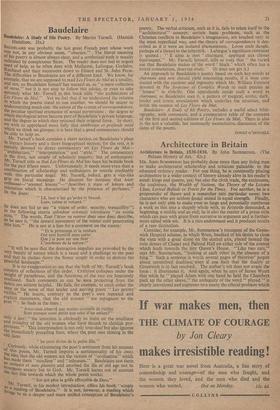BAUDELAIRE was probably the last great French poet whose work
was not, in any obvious sense, "obscure." The literal meaning of his poetry is almost always clear, and a symbolical path is usually indicated by conspicuous flares. The reader does not feel in urgent need of help, as he often does with MaIlarme, Laforgue, Corbiere, Rimbaud and their successors down- to Eluard and St. John Perse. The difficulties in Baudelaire are of a different kind. We know, for example, that we are supposed to read Les Flours du Mal as a totality, and not, so Baudelaire himself has warned us, as "a mere collection of verse," but it is not easy to follow this advice, or even to take seriously what Mr. Turnell in this book calls "the architecture of Les Flours du Mal." Yet we feel that if we understood the relation in which the poems stand to one another, we should be nearer to understanding much else: the extent of the system of correspondances; the peculiar spiritual resonance of sexual perversions ; the degree to which theological terms became part of Baudelaire's private language, and the degree to which they retained their original force. In short, we wish to apprehend more fully that tendbreuse et profonde unite which we think we glimpse; it is here that a good commentary should be able to help us. Mr. Turnell's book contains a short section on Baudelaire's place in literary history and a short biographical section; for the rest, it is entirely devoted to direct commentary on Les Flews du Mal— "architecture," "interpretation" and "style." The commentary is the fruit, not simply of scholarly enquiry, ' but of enthusiasm: Mr. Turnell tells us that Les Flews du Mal has been his bedside book for the past fifteen years. Unfortunately, it needs more even than a combination of scholarship and enthusiasm to wrestle creditably with this particular angel. Mr. Turnell, indeed, gets a vice-like grip on literal meanings. He discerns for instance that loisir embautne—"scented leisure"—"describes a state of leisure and relaxation which is characterised by the presence of perfumes." In the lines: " La, tout n'est qu'ordre et beaute. Luxe, calme et volume."










































 Previous page
Previous page